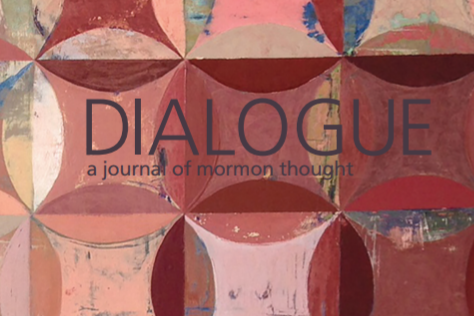Articles/Essays – Volume 49, No. 1
The Continuing Importance of Dialogue
I am delighted and honored to serve as the new editor of Dialogue: A Journal of Mormon Thought. It is particularly exciting to be coming on board as we anticipate the journal’s fiftieth anniversary. (Stay tuned for details about our September 30th celebration!) I want to thank Kristine Haglund for her fine work over the past seven years, especially for her vision of how bring a global perspective to Dialogue and move the journal into the internet age. She is one of the smartest and most talented people I know and will be a hard act to follow.
Dialogue began in 1966, when a group of young scholars at Stanford University envisioned an independent Mormon journal that spoke to both faith and intellect, bringing together academic rigor, artistic quality, diverse perspectives, and heart-felt conviction. In the journal’s inaugural issue, Eugene England argued that dialogue—speaking from our hearts and listening compassionately to others—is central to the Mormon project, and he saw the journal as a vehicle for understanding and healing. Constructive and charitable dialogue, England argued, “will not solve all of our intellectual and spiritual problems—and it will not save us; but it can bring us joy and new vision and help us toward that dialogue with our deepest selves and with our God which can save us.”
Dialogue soon became one of the main venues where Latter-day Saints discussed national and international issues of the day, like the Vietnam War, the Equal Rights Amendment, and the Civil Rights Movement; as well as unique Mormon issues, like Blacks and the priesthood and the discovery of the Joseph Smith papyri. Dialogue has, I believe, been a positive force in Mormonism, modeling ways to navigate the channels between faith and reason, and providing a better appreciation of Mormonism’s bold and expansive worldview.
Before beginning my tenure, I read Devery Anderson’s four-part history of Dialogue and reviewed its five decades of content. I am surprised at how little has changed and how relevant much of that content remains. I have also realized how revolutionary the internet has been. When Dialogue moved from California to Virginia, and then from Virginia to Utah, it required a moving truck. The journal needed extensive office space to house the staff required to publish and distribute the journal. No moving vans were necessary for the move from Boston to Orem, and email and Dropbox allow me to work with editors and production staff from around the world. The internet has also had a huge effect on Mormonism in the twenty-first century. While it has facilitated support for the various subgroups of our community, it has also balkanized the conversation, creating echo chambers for like-minded individuals. Furthermore, information’s free access has sometimes led to disenchantment with and disengagement from the Church.
Dialogue is, I believe, even more important today than it was in 1966. Presently, many Latter-day Saints are struggling with women’s status in the Church, with policies about LGBTQ members, and with discovering dusty and often disconcerting corners of Church history that they were unaware existed. Dialogue is a venue where we can explore issues like these with greater depth and nuance than an internet meme or blog post allows. Dialogue has also become the flagship journal of the burgeoning Mormon studies discipline, the source scholars of Mormonism look to for the best academic writing about Mormonism.
I am committed to continuing the legacy established by my predecessors. Specifically, I envision Dialogue providing research and commentary about both contemporary and historical Mormonism that are timely, relevant, respectful, and reliable. I welcome all voices to the conversation and want the journal to model productive discussion that challenges our minds and hearts. I want to continue expanding that discussion beyond the Intermountain West, to encompass global Mormonism in all its varieties, to engage with other religious traditions as well as with secular society.
I take my editorial cues from a letter Joseph Smith wrote from Liberty Jail: “The things of God are of deep import, and time and experience and careful and ponderous and solemn thoughts can only find them out. Thy mind, O Man [we should add O Woman], if thou wilt lead a soul unto salvation, must stretch as high as the utmost Heavens, and search into and contemplate the lowest considerations of the darkest abyss, and expand upon the broad considerations of eternal expanse; he [and she] must commune with God.” Dialogue is and will continue to be a permanent record of Mormonism’s beauty, variety, complexity, and depth.
In this issue, we feature articles that, I believe, further the discussion between Mormons, as well as between Mormons and Catholics. (The inter-faith dialogue included here originated from the 2015 Mormon studies conference at Utah Valley University, where I serve as the Program Coordinator for Mormon Studies.) Sadly, also we note the tragic passing of Stephen H. Webb, a man who championed the conversation between Mormons and Catholics and who, I had hoped, would contribute to Dialogue. Webb’s recent book, an inter-faith dialogue with BYU Professor Alonzo Gaskill, is reviewed in this issue, and we plan to remember his legacy in an upcoming issue.
—Boyd Jay Petersen, Editor


 Back to full Issue
Back to full Issue

